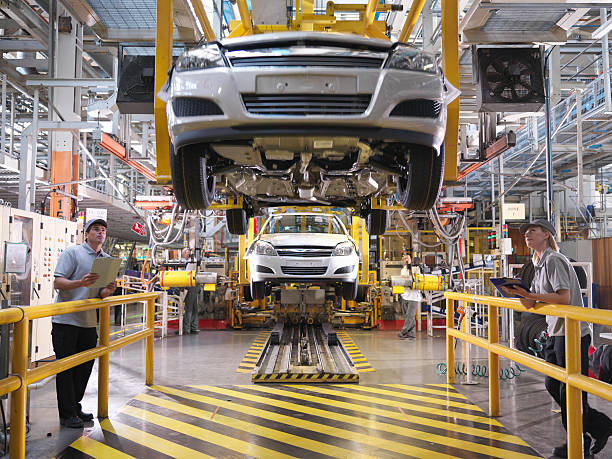Is auto manufacturing a good career path? Auto manufacturing is an important industry that plays a crucial role in the global economy.
It involves the design, production, and assembly of automobiles, trucks, and other motor vehicles.
As the demand for vehicles continues to rise, the auto manufacturing industry has become increasingly important and competitive.
For individuals who are interested in engineering, mechanics, and technology, a career in auto manufacturing may seem like an attractive option.
However, like any career path, it’s important to consider the advantages and disadvantages before making a decision.
In this article, we will explore the question of whether auto manufacturing is a good career path, by examining factors such as job prospects, required education and skills, salary and benefits, work environment, advancement opportunities, challenges, and future outlook.
Also Read:
How Many Jobs Are Available in Medical/Dental Instruments?
How Many Jobs Are Available in Air Freight/Delivery Services?
Is Auto Manufacturing a Good Career Path?
Auto manufacturing can be a good career path for individuals who have a passion for engineering, mechanics, and technology.
The industry offers a range of job opportunities, from design and research to production and assembly.
The demand for vehicles continues to rise, creating a need for skilled workers in the industry.
With the right education and training, individuals can earn a competitive salary and enjoy benefits such as health insurance and retirement plans.
However, the industry can also be physically demanding and require long hours.
Advancement opportunities may also be limited.
Ultimately, whether auto manufacturing is a good career path depends on an individual’s interests, skills, and priorities.
Job Prospects in the Auto Manufacturing Industry
The auto manufacturing industry offers a range of job opportunities, including design, engineering, production, and assembly.
With the increasing demand for vehicles, job prospects in the industry are expected to remain stable in the coming years.
However, the industry is also subject to fluctuations in the economy and changes in technology, which can impact employment.
The shift towards electric and autonomous vehicles may also change the types of jobs available in the industry.
Additionally, competition for jobs can be high, with many individuals vying for positions that require specialized skills and education.
Overall, while job prospects in auto manufacturing are generally positive, individuals should be prepared to adapt to changes in the industry and invest in ongoing education and training to remain competitive.
Education and Skills Required for a Career in Auto Manufacturing
A career in auto manufacturing typically requires a high level of technical knowledge and skills.
At minimum, a high school diploma or equivalent is required, although many employers prefer candidates with some level of post-secondary education, such as an associate’s or bachelor’s degree in engineering or a related field.
Additionally, specialized training and certifications may be required for certain positions.
Key skills for success in auto manufacturing include problem-solving, attention to detail, mechanical aptitude, and teamwork.
With the increasing use of technology in the industry, proficiency in computer-aided design and other software programs may also be necessary.
Ongoing education and training are important for keeping up with advancements in the field and remaining competitive in the job market.
Salary and Benefits in Auto Manufacturing
Salaries in auto manufacturing can vary widely depending on the type of job, experience level, and location.
However, in general, workers in the industry earn a competitive wage.
According to the Bureau of Labor Statistics, the median annual wage for production workers in the motor vehicle parts manufacturing industry was $38,180 in May 2020.
Additionally, many employers offer benefits such as health insurance, retirement plans, and paid time off.
Unionized positions may also provide additional benefits and job security. However, entry-level positions may have fewer benefits and opportunities for advancement.
Overall, the compensation package in auto manufacturing is generally competitive, but it’s important for individuals to research specific job opportunities and negotiate for fair compensation.
Work Environment in Auto Manufacturing
The work environment in auto manufacturing can vary depending on the specific job and employer.
Some workers may be in a traditional factory setting, while others may work in research and design offices or testing facilities.
Work may involve standing or sitting for long periods of time, and the job may be physically demanding.
In some cases, workers may be exposed to noise, fumes, and other hazards.
However, employers are required to provide a safe and healthy workplace for employees, and safety training and equipment are typically provided.
The work environment may also involve working in teams and collaborating with colleagues.
Overall, the work environment in auto manufacturing can be challenging but also rewarding for individuals who enjoy hands-on work and problem-solving.
Advancement Opportunities in Auto Manufacturing
Advancement opportunities in auto manufacturing can vary depending on the employer and job position.
For entry-level positions, there may be opportunities to advance to higher-skilled positions within the same department or to move into a management role with additional training and education.
Some employers offer tuition assistance or other programs to support employee career development.
Additionally, with the increasing use of technology in the industry, there may be opportunities to specialize in a particular area or to work in research and development.
However, competition for advancement opportunities can be high, and additional education and training may be required.
It’s important for individuals to seek out opportunities for growth and to network with colleagues and industry professionals to increase their chances for advancement.
Challenges and Drawbacks of a Career in Auto Manufacturing
A career in auto manufacturing can be challenging and demanding.
The work may involve standing for long periods, working in noisy or hazardous environments, and dealing with physical demands such as lifting heavy objects.
Additionally, advancements in technology and changes in the industry may require ongoing education and training to remain competitive.
The job may also involve long hours, including working on weekends and holidays.
Finally, competition for jobs can be high, particularly for positions that require specialized skills or education.
Overall, while a career in auto manufacturing can be rewarding, individuals should carefully consider the challenges and drawbacks before pursuing this career path.
Also Read:
Is Air Freight/Delivery Services a Good Career Path?
Is Industrial Specialties a Good Career Path?
Conclusion
To summarize, auto manufacturing can be a good career path for individuals who have a passion for mechanics, engineering, and technology.
The industry offers a range of job opportunities, including design, production, assembly, and research.
With the increasing demand for vehicles, job prospects in the industry are expected to remain stable.
Salaries in auto manufacturing are competitive, and many employers offer benefits such as health insurance and retirement plans.
However, the industry can be physically demanding and may require long hours. Advancement opportunities may also be limited.
Ultimately, individuals should carefully consider their interests, skills, and priorities before pursuing a career in auto manufacturing.







1 comment